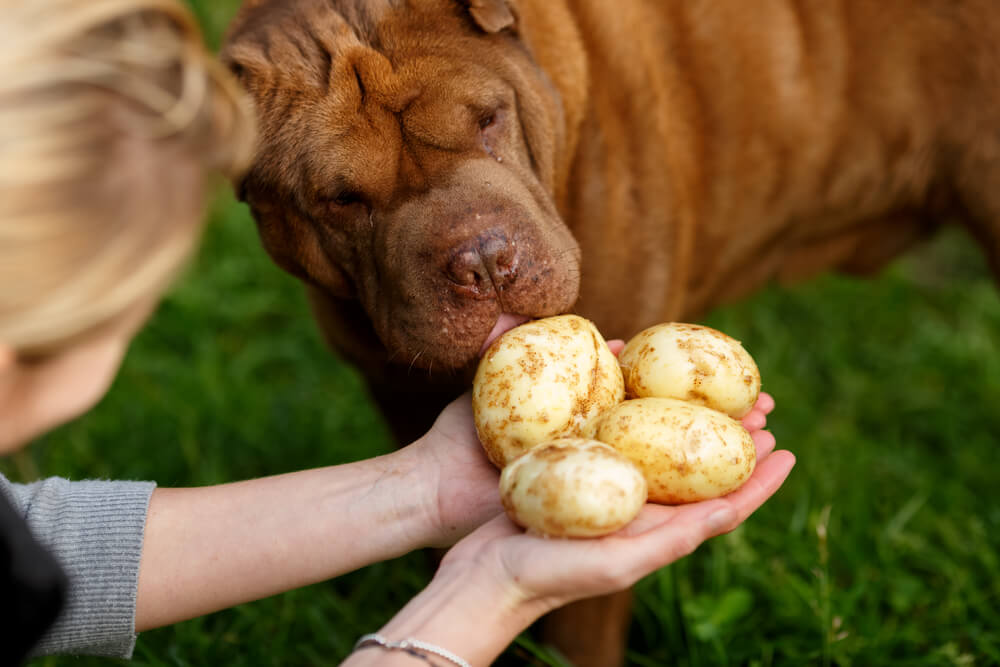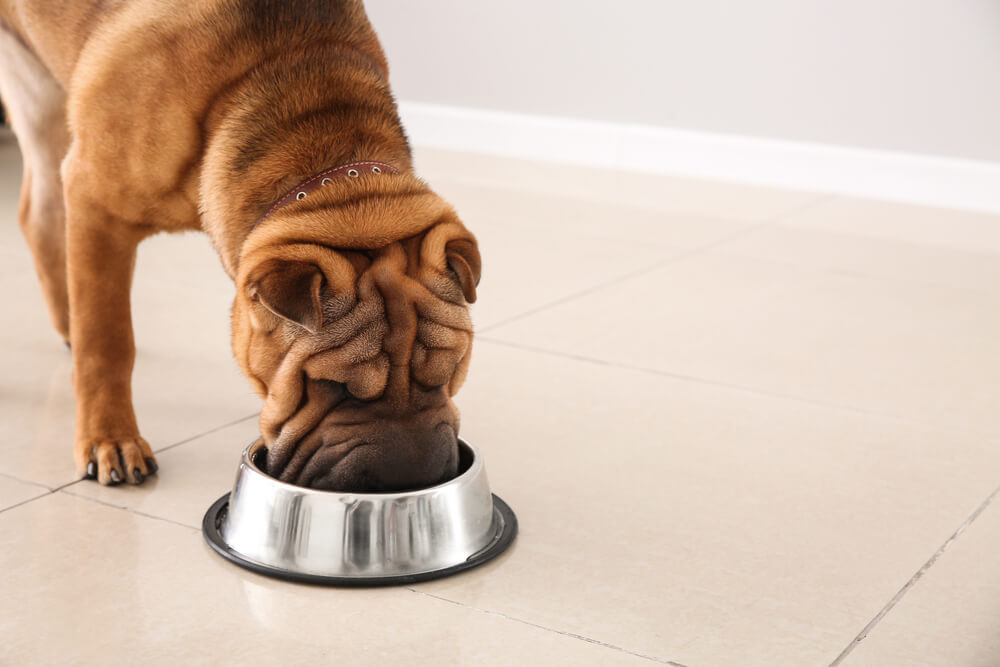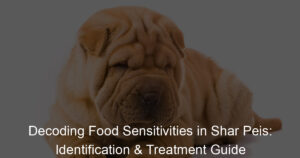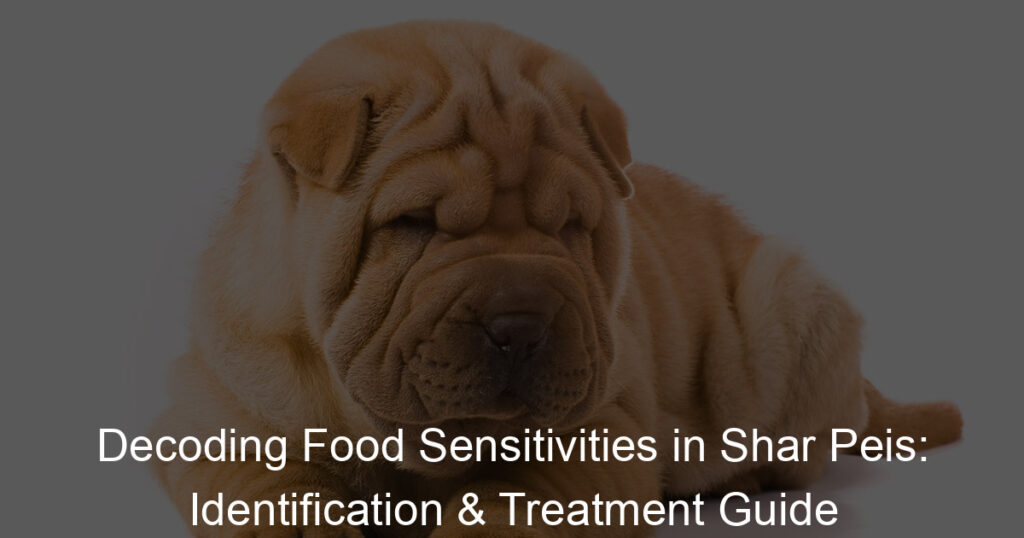A Comprehensive Guide to Feeding Your Shar Pei: What Can They Eat and What They Cannot?
Shar Peis are an ancient breed of dogs hailing from China, distinct in their appearance due to their deep wrinkles and sturdy build. Despite their somewhat aloof nature, they are beloved by many for their loyalty and affection towards their families. However, Shar Peis, like all dog breeds, have specific dietary needs and sensitivities. This guide provides detailed insights into the foods that your Shar Pei can and cannot eat, along with relevant information about their diet and health.
Understanding a Shar Pei’s Dietary Needs
Each dog breed is unique, and so are their dietary requirements. Shar Peis, due to their distinctive genetic makeup, have different nutritional needs compared to other breeds. This breed is prone to certain health issues such as skin allergies, and a condition known as Shar Pei Fever, which affects their immune system.
Therefore, it’s crucial to maintain a balanced diet for adult dog that includes proteins, carbohydrates, fibers, fats, and essential vitamins and minerals. Understanding these needs can help promote your Shar Pei’s health and longevity, reducing the risks of health complications.
The Importance of High-Quality Dog Food
When it comes to feeding your Shar Pei, commercially produced, high-quality dog food should be the first choice. Look for brands that prioritize real, whole-food ingredients, and steer clear of products containing artificial colors, flavors, and preservatives.
High-quality dog food is carefully formulated to meet the diverse nutritional needs of dogs, considering various factors like age, size, and breed. Hence, this type of food should form the majority of your Shar Pei’s diet.
Fresh Fruits and Vegetables
In addition to commercial dog food, fresh fruits and vegetables can be an excellent supplementary source of vitamins, minerals, and fiber for your Shar Pei. Foods like carrots, apples, blueberries, and green beans are safe for consumption.
But remember that while these food items can provide beneficial nutrients, they should not replace a well-balanced dog food diet. They should be offered in moderation, providing a bit of variety and extra nutrition to your pet’s diet.
Lean Meats and Fish
Protein is a vital element in your Shar Pei’s diet, contributing to their growth, energy, and overall well-being. Lean meats such as chicken, turkey, and beef, as well as fish like salmon, are excellent protein sources.
However, it’s important to ensure that these are cooked properly and unseasoned before serving, as certain spices and seasonings can lead to serious digestive health issues and are potentially harmful to dogs.
Dairy Products
When it comes to dairy products, it’s a bit of a mixed bag. Some Shar Peis can handle small amounts of plain yogurt or cottage cheese, which provide beneficial probiotics that can aid in digestion.
However, it’s important to note that many dogs are lactose intolerant, including Shar Peis. Lactose intolerance can lead to gastrointestinal upset, so it’s crucial to monitor your dog’s reaction closely and discontinue feeding dairy if you notice any signs of discomfort.
Foods to Avoid
Certain foods that are perfectly safe for human consumption can be harmful, even lethal, to your Shar Pei. These include chocolate, caffeine, alcohol, grapes, raisins, onions, garlic, macadamia nuts, and xylitol, an artificial sweetener commonly used in many sugar-free products.
In addition, avocados, while healthy for humans, contain a substance called persin which can cause vomiting and diarrhea in dogs.
Special Considerations for Shar Peis
Shar Peis are prone to a specific condition known as Familial Shar Pei Fever (FSF). FSF is an inherited disease that is characterized by recurring episodes of fever and swelling in the hocks. While there’s no specific diet to prevent this condition, maintaining a balanced diet and avoiding known triggers can help manage it.
This includes avoiding highly processed foods and those with artificial additives, as they can potentially exacerbate the condition. Consulting with your vet can help you tailor a diet that suits your Shar Pei’s individual needs, taking into account any health conditions they might have.
Supplements for Shar Peis
In some cases, supplements can be an essential part of your Shar Pei’s diet, especially if they have specific health conditions. For instance, fish oil is known to benefit skin and coat health, while glucosamine can support joint health, a relevant factor given Shar Pei’s propensity for joint issues.
However, it’s important to remember that not all supplements are created equal. Always consult your veterinarian before introducing any new supplement to your dog’s diet to ensure it’s safe and beneficial for them.

The Risk of Obesity in Shar Peis
Shar Peis, like any other breed, can be prone to obesity if overfed or not exercised enough. Excess weight in dogs can lead to a host of health problems, including diabetes, heart disease, and arthritis.
Therefore, it’s of utmost importance to strike a balance between their food intake and regular exercise to stay healthy throughout. Keep in mind that treats, while a great training aid and occasional indulgence for your pet, count towards their daily caloric intake and should be given sparingly to prevent weight gain.
The Importance of Regular Vet Check-ups
Regular vet check-ups play a vital role in monitoring your Shar Pei’s health and ensuring their diet meets their nutritional needs. Your vet can provide guidance on the right food portions, suggest necessary dietary changes, and help detect any potential health issues early, preventing serious complications.
Additionally, as your Shar Pei ages, their dietary needs may change, and regular vet visits will help you adapt their diet accordingly.
Importance of Mental Stimulation in Shar Peis
While physical health is crucial for your Shar Pei, mental stimulation is equally important. Providing mental enrichment can prevent behavior problems and enhance their overall well-being. One way to do this is by using food puzzles and interactive feeding toys.
Not only do they stimulate your dog’s mind, but they also help manage their eating speed, which can prevent digestion issues.
Changing Diets: How to Do It Right
If you find that you need to change your Shar Pei’s diet, it’s crucial to do it gradually to prevent digestive upset. Suddenly switching foods can cause stomach upset, diarrhea, or even vomiting.
Start by mixing a small amount of the new food with their current diet, gradually increasing the proportion of the new food over a week or two. This allows your Shar Pei’s digestive system to adjust to the new diet smoothly.
Homemade Food: Pros and Cons
Preparing homemade food for your Shar Pei gives you complete control over what they’re eating. It’s a great way to avoid preservatives and additives that are often found in commercial dog food. However, preparing a balanced, nutritious meal for your dog can be tricky and time-consuming.
If you’re considering this route, consult with a vet or a pet nutrition expert to ensure that your homemade diet meets all your Shar Pei’s nutritional needs. This is particularly important to ensure they get the correct amounts of nutrients and to prevent nutritional deficiencies or imbalances.
Treats and Rewards
Treats and rewards are not only a means to show affection but can also be useful tools for training your Shar Pei. However, it’s crucial to remember that treats should make up only a small portion of your dog’s daily caloric intake – typically no more than 10%.
Over-reliance on treats can lead to obesity and nutritional imbalances. Opt for healthy treats like carrots or apple slices, or choose high-quality commercial treats designed specifically for dogs.
Food Allergies and Intolerances in Shar Peis
Shar Peis, like any breed, can suffer from food allergies or intolerances. Common allergens include wheat, soy, corn, dairy, and certain proteins. Signs of a food allergy or intolerance can include itching, excessive shedding, redness, skin infections, vomiting, and diarrhea.
If you suspect that your Shar Pei has a food allergy or intolerance, consult with your vet. They can help identify the allergen and recommend an appropriate hypoallergenic diet.
Hydration: An Essential Aspect
Water is an essential part of your Shar Pei’s diet. Always ensure that your pet has access to clean, fresh water. This becomes even more important during hot weather or after exercise when your dog’s body may be more prone to dehydration. While canned dog food does provide some moisture, it should not be relied upon as the sole source of hydration.
Understanding Food Labels
Understanding how to read and interpret dog food labels is crucial when choosing the best pet food ever for your Shar Pei. Look for foods where a source of animal protein is listed as the first ingredient, and avoid foods that contain unnamed meat meals or by-products, as well as artificial colors, flavors, and preservatives. The label should also indicate that the food meets the nutritional standards established by the Association of American Feed Control Officials (AAFCO).

The Role of Life Stages in Diet Selection
Just as human nutritional needs change with age, so do those of Shar Peis. Puppies, adults, and seniors all have different dietary requirements. For instance, puppies require a higher protein content for growth, while senior dogs may benefit from a diet lower in calories but higher in fiber and certain essential nutrients too. Selecting a diet appropriate to your Shar Pei’s life stage will ensure they’re receiving the right nutrition for their needs.
In conclusion, feeding your Shar Pei a healthy weight well-balanced diet that meets their unique dietary needs can significantly contribute to their health, longevity, and quality of life. Always consult with your vet or a pet nutrition expert when making dietary decisions for your Shar Pei to ensure they’re getting the best possible nutrition.
Brand Name Product Type Key Ingredients Free From Suitable for Blue Buffalo Life Protection Formula Dry Dog Food Deboned Chicken, Brown Rice, Barley, Oatmeal, Pea Fiber Poultry by-product meals, corn, wheat, soy, artificial flavors, and preservatives All life stages Wellness CORE Grain-Free Dry Dog Food Deboned Turkey, Turkey Meal, Chicken Meal, Peas, Potatoes Grains, artificial colors, flavors and preservatives
Adult Canidae PURE Limited Ingredient Dry Dog Food Salmon, Salmon Meal, Menhaden Fish Meal, Sweet Potatoes, Peas Wheat, corn, soy, artificial flavors and colors Adult Royal Canin Breed Health Nutrition Dry Dog Food Brown Rice, Chicken Fat, Chicken By-Product Meal, Brewers Rice, Wheat N/A Adult Shar Peis Hill’s Science Diet Sensitive Stomach & Skin Dry Dog Food Chicken
Food Portion Control for Shar Peis: How Much Should They Eat?
Determining the right amount of food for your Shar Pei is crucial for their optimal health, and well-being. Overfeeding can lead to obesity and associated health problems, while underfeeding can lead to malnutrition. Portion sizes should be determined based on your pet’s weight, age, activity level, and overall health.
Puppies typically require more frequent meals with smaller portions due to their high energy levels and rapid growth. Adults, on the other hand, may only need to be fed twice daily. Always consult your vet for specific guidance on portion sizes for your individual dog. A high-quality, balanced diet will help ensure your Shar Pei gets all the nutrients they need, without unnecessary excess calories.
Seasonal Dietary Adjustments for Shar Peis
Like humans, dogs’ nutritional needs can change with the seasons. During colder months, your Shar Pei may require slightly more food, as keeping warm uses more energy. Conversely, in the hot summer months, your dog might become less active to conserve energy and stay cool, thus requiring slightly less food.
Also, make sure your Shar Pei always has access to fresh water, especially during the summer months, to prevent dehydration. Always monitor your dog’s weight and adjust portions accordingly, and consult your vet if you have any concerns.
Feeding Challenges in Shar Peis: How to Handle Picky Eaters
Like people, some dogs can be picky eaters. This can be particularly challenging when trying to provide a balanced diet. If your Shar Pei is a fussy eater, try varying the flavors and textures of their food. Introduce new foods gradually and be patient. Using a little bit of a tasty, dog-safe food topper can sometimes encourage them to eat.
However, it’s important not to indulge in unhealthy treats or table scraps to tempt them to eat, as this can lead to nutritional imbalances and weight gain. If your Shar Pei consistently refuses to eat, consult your vet, as it may be a sign of underlying health issues.
Importance of Dental Health in Relation to Diet
Dental health is an often overlooked aspect of a dog’s overall health and well-being. A diet consisting solely of soft, canned food might not provide the necessary abrasion to keep your dog’s teeth clean. Dry kibble, on the other hand, can help scrape away plaque and prevent the build-up of tartar.
Dental chews and specific dental care dog foods can also aid in maintaining oral health. Regular check-ups with your vet are essential, as dogs can develop dental disease which can lead to other serious health problems if left untreated.
Specific Nutritional Needs for Shar Pei Puppies
Shar Pei puppies have different dietary needs than adults. Due to their rapid growth and high energy levels, they require more protein and certain nutrients like DHA for brain and eye development.
Puppy food is specifically formulated to meet these needs. As a general rule, puppies should be fed a diet specifically designed for growth until they reach about 80% of their expected adult size. This typically occurs around one year of age for Shar Peis, at which point you can transition them to adult food. Always consult your vet for specific dietary advice for your puppy.
Dealing with Common Digestive Issues in Shar Peis
Shar Peis can sometimes experience digestive issues, which can manifest as diarrhea, constipation, excessive gas, or vomiting. These can be caused by a variety of factors, including dietary changes, food intolerances, allergies, parasites, or underlying health conditions.
If your Shar Pei has recurrent digestive issues, it may be worth considering a diet for sensitive stomachs, which are often formulated with easily digestible ingredients and are free from common allergens.
Probiotics might also be beneficial, as they can support a healthy gut microbiome. However, any persistent or severe digestive issues should be evaluated by a vet to rule out more serious health concerns.
Probiotics and Digestive Enzymes: Should Your Shar Pei Have Them?
Probiotics are beneficial bacteria that support a healthy gut microbiome, aiding in digestion and nutrient absorption, and contributing to a robust immune system. Digestive enzymes, on the other hand, help break down food into nutrients that the body can utilize.
Some dogs, particularly those with digestive issues, may benefit from the addition of probiotics or digestive enzymes to their diet. However, it’s essential to consult with your vet before introducing any supplements to ensure they’re appropriate and beneficial for your dog’s digestive system. Not all dogs need these supplements, and in some cases, they can even be harmful.
Special Dietary Considerations for Pregnant or Nursing Shar Peis
Pregnant or nursing Shar Peis have increased nutritional demands to support the growth of puppies and milk production. They may require more frequent meals and a diet higher in protein and certain nutrients.
It’s often recommended to feed a high-quality puppy food or a food specifically formulated for all life stages to pregnant or nursing dogs, as these foods have higher nutrient levels. Always consult your vet for specific dietary recommendations for your pregnant or nursing Shar Pei to ensure they and their puppies are getting the necessary nutrients.
Effects of Aging on Dietary Needs of Shar Peis
As your Shar Pei ages, their dietary needs will change. Senior dogs often become less active and require fewer calories to prevent weight gain. However, they may need more fiber and certain nutrients, like omega-3 fatty acids, to support joint health and combat age-related conditions.
Some senior dogs also struggle with dental issues or reduced appetite, in which case softer foods or smaller, more frequent meals might be beneficial. Your vet can provide guidance on adjusting your senior Shar Pei’s diet to best support their health and well-being.
Identifying and Managing Food-Related Skin Conditions in Shar Peis
Some Shar Peis may develop food-related skin conditions, which can manifest as itching, redness, excessive shedding, or recurrent skin infections. These can often be caused by food allergies or intolerances. Common food allergens for dogs include wheat, soy, corn, dairy, and certain proteins.
If you suspect your Shar Pei has a food allergy or intolerance, consult your vet. They can help identify the allergen through elimination diets or testing, and recommend a suitable hypoallergenic diet. Always consult with your vet if your Shar Pei develops any skin conditions, as these can also be caused by non-food-related factors.
Feeding Schedule: The Best Times to Feed Your Shar Pei
Establishing a regular feeding schedule is beneficial for your Shar Pei’s digestion and helps to prevent overeating. Most adult dogs do well with two meals a day – one in the morning and one in the evening.
However, puppies and some older dogs may benefit from more frequent, smaller meals. Always provide fresh water with meals, and avoid feeding your Shar Pei immediately before or after vigorous exercise to prevent gastric torsion, a serious and potentially life-threatening condition.
Raw Diet for Shar Peis: Pros and Cons
The raw diet for dogs, also known as the BARF (Biologically Appropriate Raw Food) diet, has gained popularity in recent years. Proponents of the diet argue that it’s more in line with a dog’s natural diet in the wild, offering benefits like shinier coats, healthier skin, improved dental health, and better energy levels. The diet typically includes raw meat, bones, fruits, and vegetables.
However, the raw diet also has its downsides and risks. These include potential exposure to pathogens in raw meat, unbalanced nutrition if not properly formulated, and the risk of choking or other injuries from whole bones. For Shar Peis, which are predisposed to certain skin and digestive issues, the raw diet should be approached with caution and under the guidance of a vet or a certified pet nutritionist. An improperly balanced raw diet can lead to severe health issues in dogs.

Feeding Your Shar Pei During Illness: What to Consider
When your Shar Pei is ill, their dietary needs can change dramatically. Depending on the nature of their illness, they may require a special diet, increased hydration, or even a temporary feeding tube. In some cases, specific nutrients may need to be increased or decreased in response to their condition. Always follow your vet’s dietary recommendations when your Shar Pei is sick. Maintaining their strength and health through proper nutrition is crucial for their recovery.
Grain-free Diets for Shar Peis: Are They Beneficial?
Grain-free diets for dogs have become popular in recent years, often touted for their supposed health benefits. However, the research is not clear-cut, and there’s much debate about whether grain-free diets are truly beneficial for dogs.
While some dogs with specific allergies or intolerances may benefit from a grain-free diet, most dogs can digest grains without issues. Furthermore, recent studies have linked grain-free diets to an increased risk of heart disease in certain dogs.
It’s also important to note that ‘grain-free’ doesn’t automatically mean ‘low-carb.’ Many grain-free dog foods replace grains with other carbohydrate sources like potatoes or legumes, which can be higher in calories.
If you’re considering a grain-free diet for your Shar Pei, consult with your vet to ensure it’s the right choice for your pet. Remember, every dog is unique, and what works well for one might not be the best for another.














